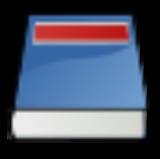
Gnome-dictionary
Encyclopedia
GNOME Dictionary, also identified as gnome-dictionary, is a DICT client written in C
by Emmanuele Bassi and others. It is part of the free software
GNOME
desktop suite, inside the gnome-utils meta-package. This allows users of GNOME to look up words on dictionary sources.
gnome-dictionary was at first an independent DICT protocol
client called gdict, created by Bradford Hovinen, Spiros Papadimitriou and Mike Hughes; it was included inside the gnome-utils meta-package during the 1.x release cycle. As a companion to the original application was also added an applet
for gnome-panel
.
After the 2.0 release of GNOME, due to lack of direct maintainership, the code base of gdict passed the point of being maintainable. In October 2005, the current maintainer of gnome-dictionary Emmanuele Bassi decided to rewrite
the application and applet from scratch, removing the old (and mostly deprecated) code.
The new gnome-dictionary was added to GNOME during the 2.13 development cycle and became part of the 2.14 GNOME release. It supports multiple dictionary sources, printing the definitions found and saving them to a text file, and has a simpler user interface. The logic of the application and the applet has been moved inside its own shared library
called libgdict which can be used by third party applications. As of July 2006 the development version of gnome-dictionary became feature equivalent to the pre-2.14 release, with the addition of the list of similar words found (also known as speller).
C (programming language)
C is a general-purpose computer programming language developed between 1969 and 1973 by Dennis Ritchie at the Bell Telephone Laboratories for use with the Unix operating system....
by Emmanuele Bassi and others. It is part of the free software
Free software
Free software, software libre or libre software is software that can be used, studied, and modified without restriction, and which can be copied and redistributed in modified or unmodified form either without restriction, or with restrictions that only ensure that further recipients can also do...
GNOME
GNOME
GNOME is a desktop environment and graphical user interface that runs on top of a computer operating system. It is composed entirely of free and open source software...
desktop suite, inside the gnome-utils meta-package. This allows users of GNOME to look up words on dictionary sources.
gnome-dictionary was at first an independent DICT protocol
DICT
DICT is a dictionary network protocol created by the DICT Development Group. It is described by RFC 2229. Its goal is to surpass the Webster protocol and to allow clients to access more dictionaries during use...
client called gdict, created by Bradford Hovinen, Spiros Papadimitriou and Mike Hughes; it was included inside the gnome-utils meta-package during the 1.x release cycle. As a companion to the original application was also added an applet
Applet
In computing, an applet is any small application that performs one specific task that runs within the scope of a larger program, often as a plug-in. An applet typically also refers to Java applets, i.e., programs written in the Java programming language that are included in a web page...
for gnome-panel
Gnome-panel
GNOME Panel is a highly configurable launcher and taskbar for GNOME. It forms a core part of the GNOME desktop.It has been replaced in GNOME 3.x by default with GNOME Shell, which only works with the Mutter window manager...
.
After the 2.0 release of GNOME, due to lack of direct maintainership, the code base of gdict passed the point of being maintainable. In October 2005, the current maintainer of gnome-dictionary Emmanuele Bassi decided to rewrite
Rewrite (programming)
A rewrite in computer programming is the act or result of re-implementing a large portion of existing functionality without re-use of its source code. When the rewrite is not using existing code at all, it is common to speak of a rewrite from scratch...
the application and applet from scratch, removing the old (and mostly deprecated) code.
The new gnome-dictionary was added to GNOME during the 2.13 development cycle and became part of the 2.14 GNOME release. It supports multiple dictionary sources, printing the definitions found and saving them to a text file, and has a simpler user interface. The logic of the application and the applet has been moved inside its own shared library
Library (computer science)
In computer science, a library is a collection of resources used to develop software. These may include pre-written code and subroutines, classes, values or type specifications....
called libgdict which can be used by third party applications. As of July 2006 the development version of gnome-dictionary became feature equivalent to the pre-2.14 release, with the addition of the list of similar words found (also known as speller).

